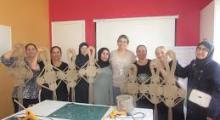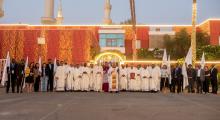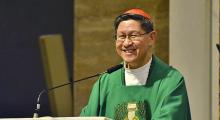Issued by the Catholic Center for Studies and Media - Jordan. Editor-in-chief Fr. Rif'at Bader - موقع أبونا abouna.org

When discussing the relationship between religion and authority throughout history, the first thing that comes to mind is the saying of the incarnate Master: "It is written: My house shall be called a house of prayer, and you have made it a den of thieves."
How does this house of prayer metaphorically transform into a den of thieves in certain places and times? By what enchanting magic does religion shift from being a means of salvation to serving the interests of ruling groups, distracting people from their vital concerns?
Religion is not the only reality that was objectivized by human beings; however, it is the most easily accessible tool for mobilizing people quickly, without holding the user accountable. Yet, as soon as the forces of the unseen and the dimensions of the beyond come into play, accountability becomes a magical word that underlies institutions, democracy, and progress.
The challenge at hand is to prevent religion from deviating from its essential path under the pressure of political and economic interests that have historically formed alliances. The only solution is immunization!
What methods of immunization can enable religion to assume the social responsibilities entrusted to it?
The first challenge is to separate the state from religion. Researchers have long advocated for the separation of religion from the state, implying that religious leaders should distance themselves from political leaders, as in the logic of "give what is Caesar's to Caesar and what is God's to God," inherited from the Renaissance.
The phrase "separation of the state from religion" is used to convey that it is the state that needs to keep its distance from religion, rather than the other way around as previously believed. The Lebanese model is a striking example, where political sectarianism ravages the nation's unity and politicians have discovered that the best way to protect their corrupt practices is to hide behind religion.
The second challenge is to acquire a proper understanding of religious principles and incorporate their values and beliefs correctly. No one has the right, in any way, to quarantine religion, monopolize its teachings, or domesticate it to serve a particular reference or political group.
Addressing this issue requires systematic and sustainable religious education. The sincere faith of believers acts as a fortress for them, both individually and collectively, guarding them against exploitation through religion. By religious education, we refer to the teachings of a particular religious belief encompassing social behavior, guiding individuals toward the path of righteousness, love for others, and society.
At this level, two aspects require attention: first, religious doctrine should be taught through the original texts rather than interpretations and explanations; second, certain texts that are no longer relevant in terms of time or scientific understanding need to be reevaluated. These measures may be challenging but are essential.
Furthermore, religion embodies freedom, justice, and peace, and it should not be entrusted solely to non-experts for its teachings. Therefore, it is necessary to train individuals on how to improve the teaching of religion and prevent superstitions from merging with its teachings.
The third challenge is to introduce good governance to religious institutions, ensuring the proper utilization of the resources available to the community, including endowments and institutions. Endowments and religious institutions of all types, along with the human capabilities at their disposal, represent an immense wealth that must be dedicated to serving believers and people at large. Consequently, they need to be well-managed, with their productivity optimized, akin to any other profit-driven private-sector institution. Waste within these institutions is unacceptable, as it has a negative impact on the quantity and quality of services provided to the people.
To achieve this, it is imperative to implement good governance practices and involve secular individuals in all management committees of religious institutions. This approach ensures the preservation and effective management of these institutions, enhancing their flexibility, productivity, and functional interaction with their surroundings.
The presence of both the laity and the clergy in the governance and management of these institutions guarantees a balance between the spiritual and material dimensions when utilizing the available resources to support those in need.
The fourth challenge is to defend freedoms within the human rights system. Believing in the Creator, belonging to Him, loving Him, and expressing gratitude for His gifts are inherent freedoms and dignities. He is the only being upon whom we do not depend for our dignity.
Religious leaders who truly believe and belong are at the forefront of defending freedoms and preserving human rights. Many religious leaders have led their people to freedom and sacrificed their lives for the rights of their communities. Therefore, religious institutions have a responsibility to protect people's rights and dignity from oppressive rulers and treacherous occupiers.
Respected religious leaders who uphold human rights, including the rights of their communities, provide a fundamental guarantee for preserving human rights and, consequently, civil peace.
The fifth challenge is to support people financially through productive and developmental projects, transforming the religious landscape from purely spiritual to a socio-economic framework that addresses people's needs. In addition to the aforementioned endowment institutions, religious organizations can make the necessary investments to provide various services to people.
These organizations can secure housing, employment opportunities, and diverse businesses, similar to private sector institutions, while engaging in investments and development initiatives. It is crucial to emphasize that religious faith does not hinder such endeavors; on the contrary, it promotes responsible stewardship.
Assisting individuals in finding employment for themselves, either through self-employment or job placements, can lift families out of the cycle of unemployment and destitution, reducing their dependence on political feudalism or nepotism.
This approach adds developmental value to society as a whole, given the potential scale of investments and development projects, both in rural and urban areas, which can be undertaken by religious institutions.
In conclusion, a correlation between science and religion must exist to protect both. Religion should stand up against oppressive rulers, serving the people, as the Sabbath is for humankind. However, this requires wisdom, discretion, and extensive knowledge.







